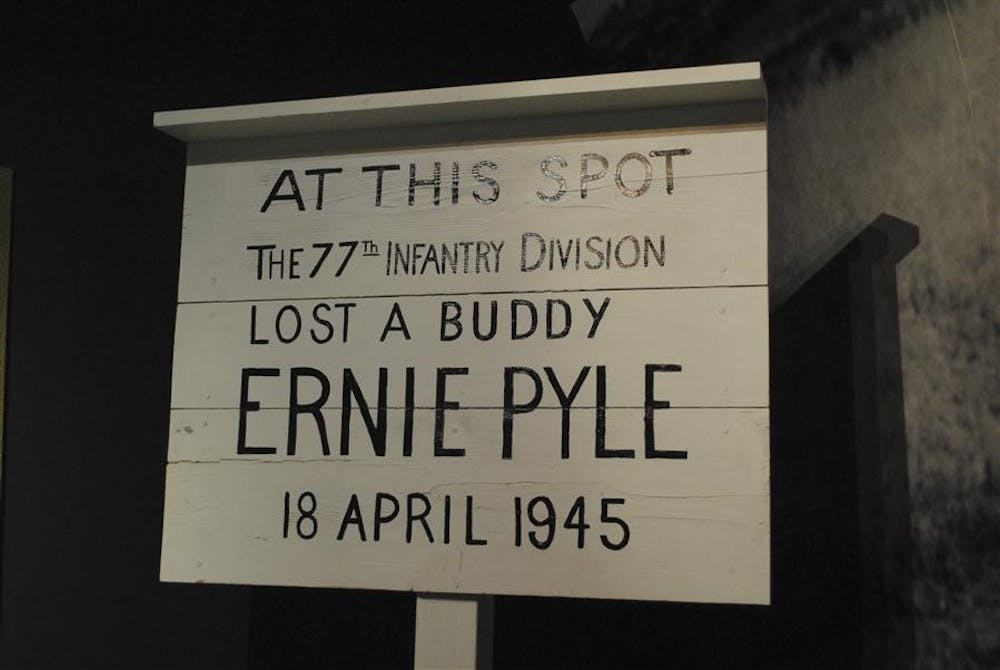You can’t buy a gallon of milk anymore in Dana, Ind.
The grocery store is gone. So are the schools and the gas station. The few residents who stayed after business took over agriculture don’t have much to cling to anymore.
They have each other, though — and their treasured identity as the hometown of renowned World War II correspondent Ernie Pyle.
“When asked where Dana is, people here say, ‘It’s the hometown of Ernie Pyle,’” said farmer and U.S. Army veteran Phillip Hess. “That is the identity we have left. A lot of the other things are gone.”
Since 1976, in their small town nestled among the cornfields of Indiana’s western border, Dana natives have preserved their Pyle identity through a museum in his childhood home. But in recent years, Dana residents have felt the pressures of fading historical fame.
“A lot of people now would not know who Ernie Pyle was without some academic background,” Hess said.
Pyle has been called history’s greatest war correspondent. He spent his childhood in Dana and pursued a journalism degree at IU. He left a semester short of graduation to start his newspaper career. He was a national columnist for the Scripps Howard news service, during which he developed a reputation for coverage of the Great Depression.
He earned his highest recognition as a World War II correspondent while embedded with the troops. Pyle was a war hero to many, fighting from the front lines with words rather than ammunition. But in 1945, Pyle was killed by gunfire on a remote Japanese island.
Pyle’s humble small-town upbringing was reflected in his work, and Dana embraced his memory and his mission. With the state’s help, Pyle’s hometown friends turned his childhood home into the Ernie Pyle Museum.
The house was moved downtown and declared a historic site. From 1976 through the early 1990s, Pyle artifacts slowly filled it. Pyle was Dana’s hometown hero.
“For Dana, it’s kind of a source of pride. The style of writing he did reflects the character of the community,” Hess said.
So in 2005, when the state of Indiana began reducing funding to the source of their hometown glory, Dana natives took it personally.
And in 2009, when the state announced it was severing all monetary support to the museum because of low attendance, Dana decided to fight back.
After nearly three years of appeals to the state, Friends of Ernie Pyle, the non-profit group that supported the museum from its inception, gained ownership of the house in November 2011.
But the museum they saved wasn’t given back to them in the condition
they left it.
Since the museum was Indiana’s property when the state severed ties with the building, it took an assortment of Pyle’s personal artifacts: his typewriter, passport, notepads, credentials, photographs, uniforms and hundreds of letters, Hess said.
“We’ve got a lot of historical stuff, just not much of Ernie’s stuff anymore,” he said.
The building that houses the IU School of Journalism is named Ernie Pyle Hall, and each year, professor Owen Johnson takes a group of students overseas during spring break for a class called “In the Footsteps of Ernie Pyle.” He also takes his students to Dana’s museum.
“I think, from an outside perspective, visiting Dana can give people a little bit of a sense of where Ernie Pyle came from,” Johnson said. “Growing up in a small town like that certainly shaped his perspective, and it’s very important for outsiders to gain a sense of understanding. The Ernie Pyle museum has become a focal point of the community.”
In an attempt to draw in more visitors, the Friends of Ernie Pyle renamed the museum the Ernie Pyle World War II Museum on Jan. 1.
Because they will no longer receive state funds, the volunteers who run the museum will function with gift shop proceeds from years past — a total of $45,000 — and donations.
“We believe that the location should be in Dana and that the story ought to be told,” Hess said. “And we will do anything to preserve that.”
Ernie Pyle Museum renamed
Dana, Indiana, remembers hometown hero, World War II correspondent

Get stories like this in your inbox
Subscribe





